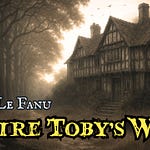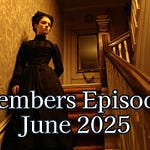The Pomegranate Seed
The pomegranate seed is a reference to the myth of Persephone and Demeter. Winter and Spring and the Lord of the Underworld. In a sense Mother and daughter are the same, and one aspect of the woman spends time in the world of the dead, while the other walks the world of the living.
Kenneth disappears to see about ‘their passages.’ It is clear that it is his passage over the river Styx to the underworld that he finally arranges. He has been so attached to the ghost of his late wife, that he cannot escape her as she dominated him in life. He wants to escape, he wants to live with his new wife and have new experiences, but he is simply not strong enough to make it so.
Charlotte represents the living, mortal world while Elise Ashby represents death. In that sense it is a story about a choice that all of us have to make: to live in this world and be of it and do what work it sets before us or spend our time dreaming of the underworld whence we came and to which we shall return. Deep for a Monday morning, I feel.
However, Wharton’s skill as an observer of human behaviour also shines in this story, and for most of the time it is the skilful chronicle of that commonplace (sadly) or married life—the suspicion that our lover’s heart is tethered elsewhere. Trivial, but profoundly upsetting. Charlotte spends a lot of time arguing this when then that way that her husband is having an affair, trying to convince herself in a way that rings very true.
Old Mrs Ashby plays the role of the mother goddess who loses her son in this case to the Underworld. This doesn’t totally fit. But she is on the side of life, despite her age, and she supports Charlotte and regrets her son’s attachment to his late wife.
In construction there are four parts. We begin with a scene of Charlotte’s unsettledness, standing at the door. What had been her haven now disquiets her and she finds no comfort in modern New York or inside in her home that she once loved.
She coveted the house when it was Elise’s and of course it has always remained Elises and again this is the story of the second wife who is dutiful and loving but is reminded by the possessions and moments and indeed children that she can never really supplant the first. Iff the first wife had been unfaithful then it would be easier, but by dying while he still loved her this has made the second wife’s job impossible. She can never win.
Wharton raises questions throughout: what are the letters? Who are they from? Did he love this other woman? But she lays hints as the tension builds that these are not normal letters, they are grey, the handwriting is androgynous (perhaps because Elise is not a woman but a spirit? And therefore neither male nor female in that vague gray underworld?)
But its a slow burn and the tension is that of a story about adultery, until it is revealed at the end to be a story about death’s hold on the living. Depressed now?
She uses a lot of Britishisms: holiday for vacation, fortnight for two weeks —I don’t think Edith Wharton played Fortnite.
The ending is ambiguous. Wharton prefers subtle hints rather than clear resolutions in her ghost stories, listen to Bewitched or Mr Jones on this channel for that.
But it seems to me that both the Old Mrs Ashby and Charlotte are creatures of the daylight world and so they pretend that Kenneth’s disappearance is a daylight occurrence when they know that he has gone down into the night world. Still, they act as is their natures, and call the everyday police.
If You Appreciate The Work I’ve Put In Here
Become A Patreon For Bonus Stories
Or buy me a coffee , if you’d like to keep me working.
Music by The Heartwood Institute
Get the book here















Share this post